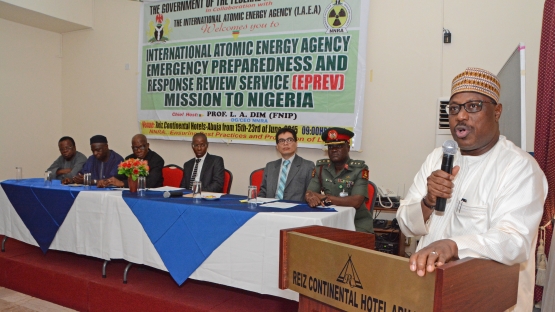The IAEA has recently implemented several Emergency Preparedness Review (EPREV) services in a number of Member States in the African region, including Ghana, Kenya, Nigeria, South Africa and the United Republic of Tanzania. The EPREV missions were carried out under an ongoing technical cooperation (TC) project, and were supported by the European Union (EU).
Radioactive materials are used all around the world in different fields such as medicine, agriculture, industry and research. Due to accidents, natural disasters or malicious acts, emergencies involving radioactive materials can and do happen. For example, an earthquake can damage a hospital building, including the teletherapy sources within it. In emergency events involving radioactive materials, national emergency response mechanisms must respond in order to keep the public safe.
EPREV missions are conducted by the IAEA's Incident and Emergency Centre (IEC), which is the global focal point for emergency preparedness and response for nuclear and radiological safety or security-related emergencies or threats. EPREV missions are used to review a country's emergency preparedness and response (EPR) arrangements, and to offer recommendations and suggestions for improvement. Under the aegis of the ongoing regional project, EPREV missions were conducted by IAEA specialists in Ghana in May 2015; in Kenya in March 2015; in Nigeria in June 2015; in South Africa in February 2014; and in the United Republic of Tanzania in August 2014.
An EPREV mission is conducted in multiple phases and begins with a self-assessment done by the country, followed by a preparatory mission to review logistics. EPREV missions, which are typically ten days in duration, provide an opportunity for international experts to work with counterparts in the host country to review national EPR arrangements in detail and to identify recommendations, suggestions, and good practices. Reviews may cover one or more emergency preparedness categories, based on the hazard assessment in the country, but will always involve technical and operational organizations at the local and national level.
The recommendations resulting from an EPREV mission are provided to the national authorities in a report. This becomes a starting point for the country to develop a national plan of action to improve their capabilities. The IAEA supports its Member States in implementing national plans of action to improve EPR, through, for example, targeted expert advice and support or training of specific organizations involved in emergency response. The overarching objective is to help the Member State assure its preparedness to respond effectively in the event of an emergency involving radioactive material.
 |
Project RAF9052 is conducted by the IAEA, and co-funded by the European Union |


